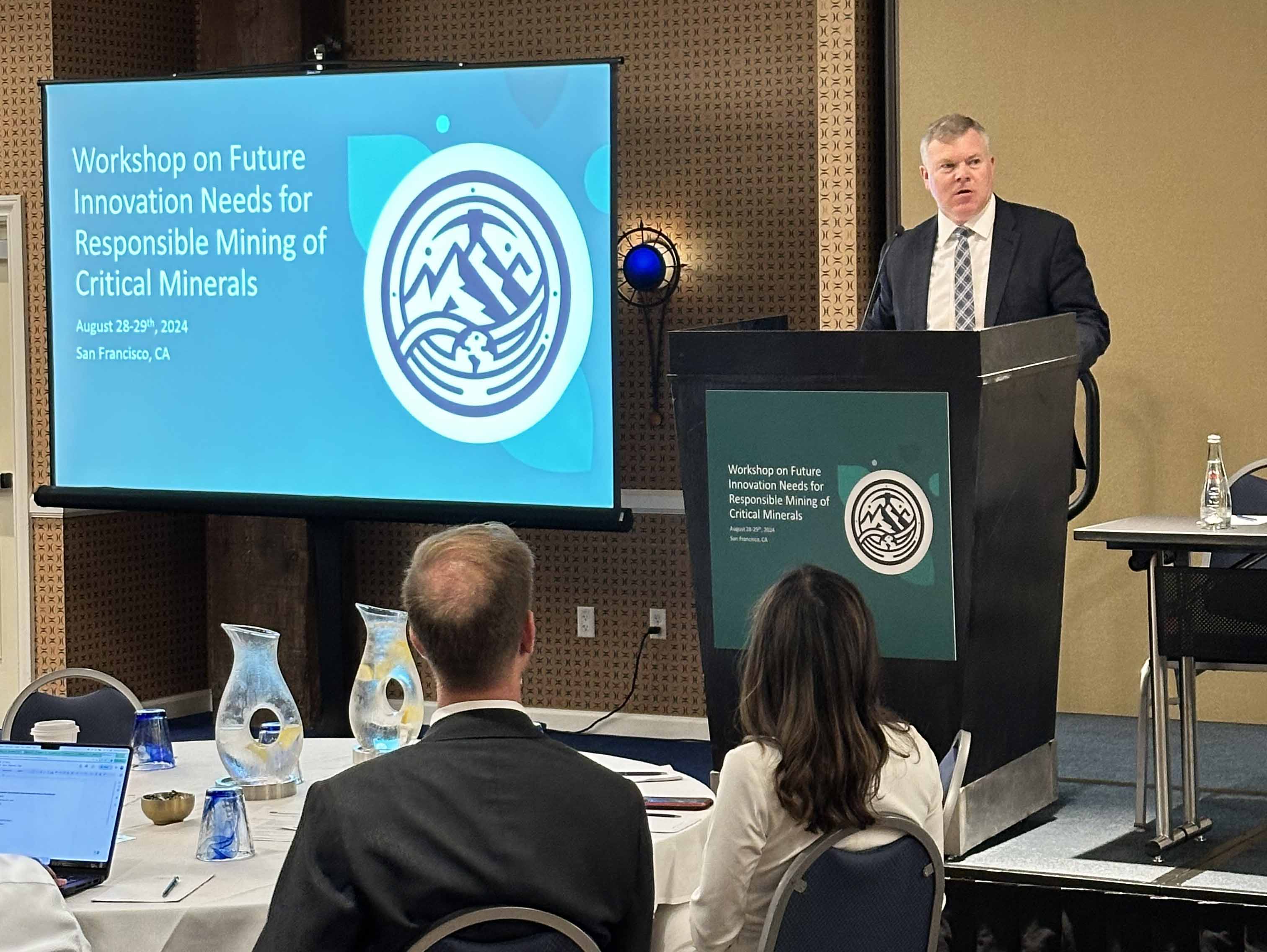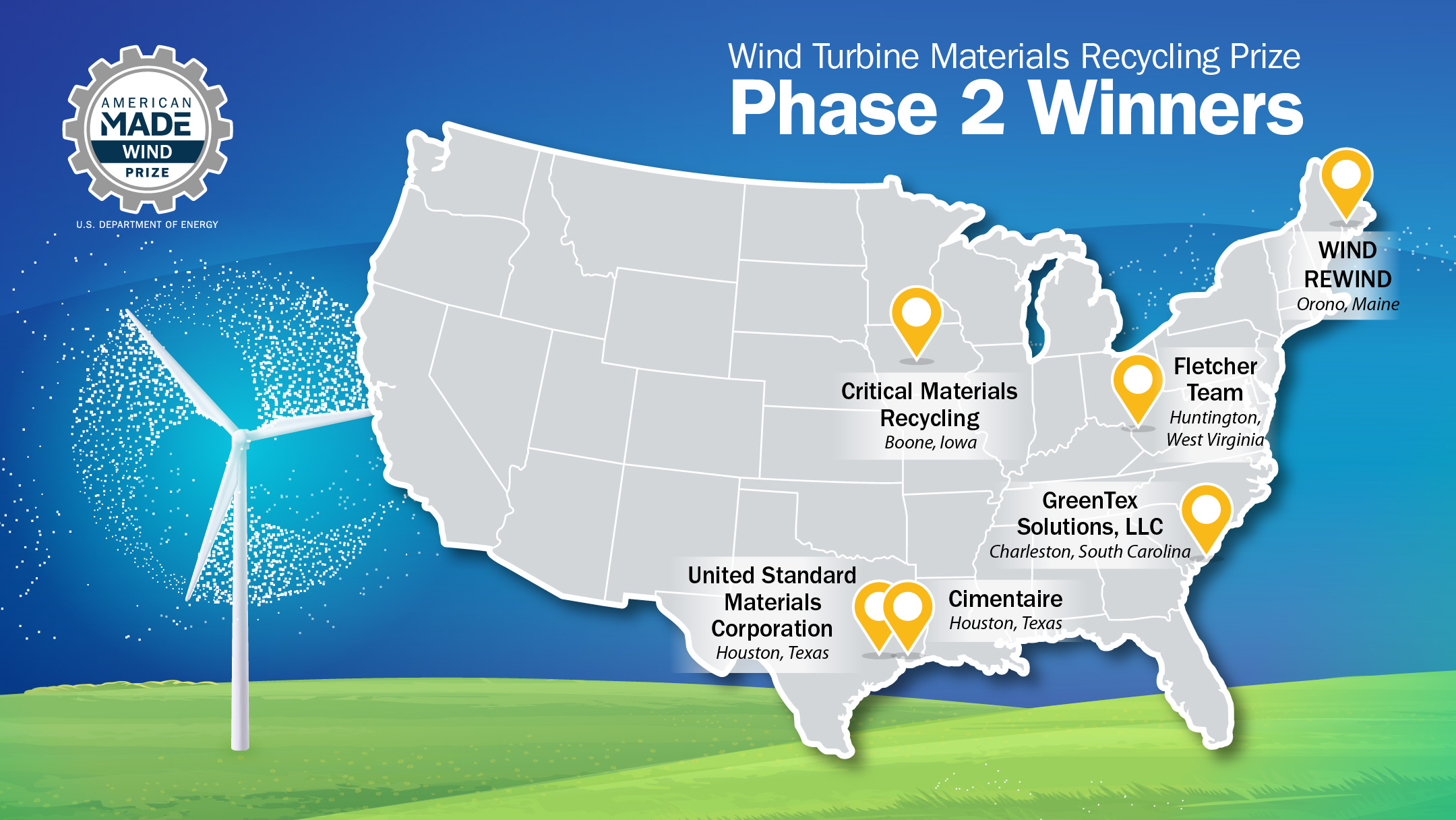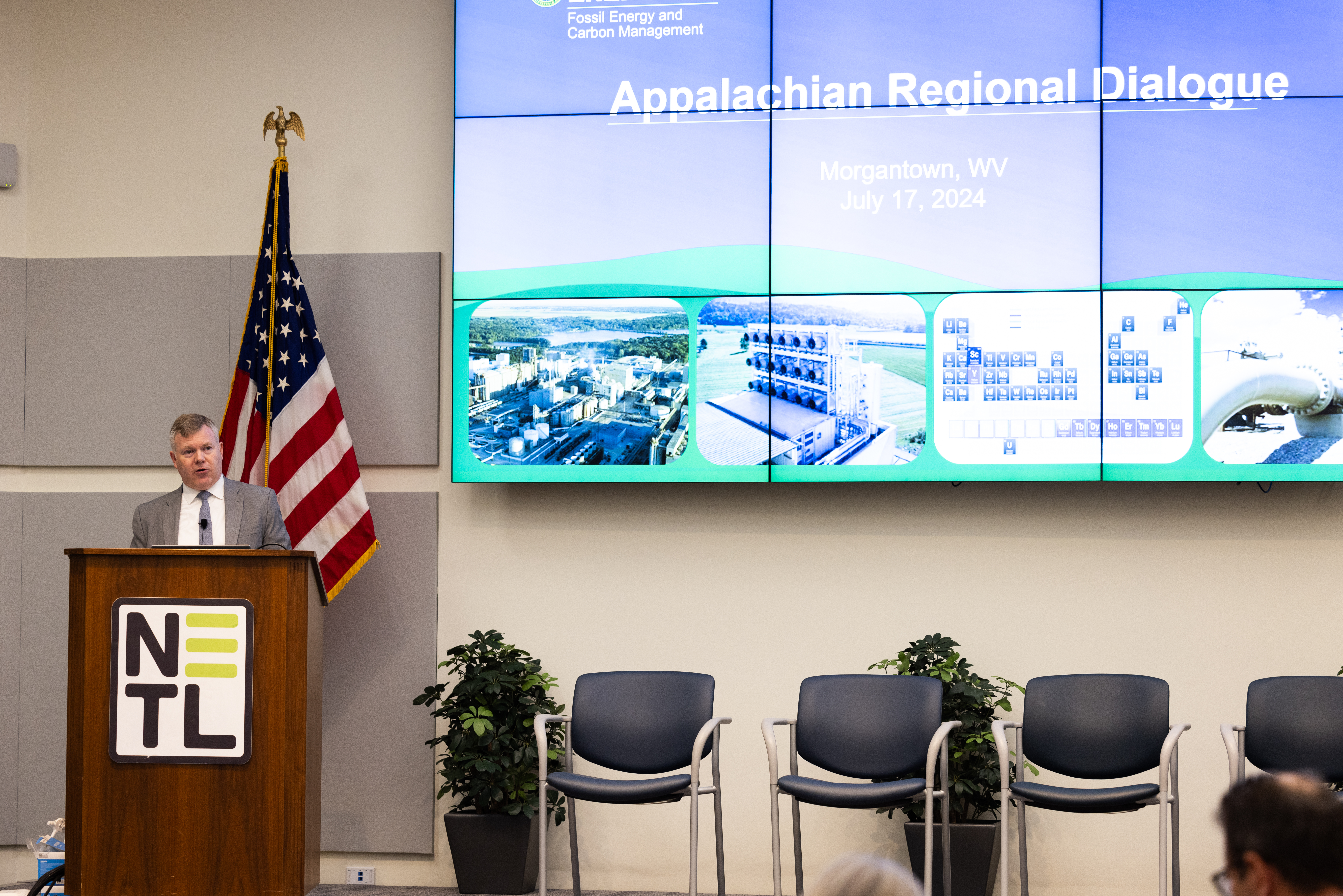Welcome to the first issue of the U.S. Department of Energy Critical Materials Collaborative's quarterly newsletter about critical minerals and materials.
Critical Minerals & Materials Program
October 1, 2024Letter from Leadership
Welcome to the first CMC newsletter! It only seems fitting to start by introducing the CMC. Our mission is to accelerate the research, development, and deployment of technologies that will secure domestic CMM supply chains, supporting the nation’s clean energy and national security goals.
Since our launch in the summer of 2023, the CMC has been focused on building out the federal infrastructure to support the CMM innovation ecosystem. We’ve enhanced communication and coordination among DOE, other government agencies, and stakeholders working on CMM projects. And to grow connective tissue across this community, we launched the Critical Minerals and Materials Matchmaker (CM3).
Over the past year, we’ve made significant strides in establishing the collaborative. We’ve expanded our DOE membership, welcomed our first project awardees through three CMC-coordinated funding opportunities and renewal of the Critical Materials Innovation (CMI) Hub, and are working on integrating federal agencies across the U.S. government. With a strong foundation in place, we’ve turned our attention to the future. The CMC initiated the development of a DOE research roadmap for CMM, outlining our vision for the next decade shaped by valuable insights from government, academia, and industry stakeholders.
In each edition of this newsletter, you can expect updates on our latest activities, funding opportunities, and key events that drive our collective mission forward. There’s much more to come, and we’re excited to continue building a strong innovation ecosystem with you as we tackle the critical challenges ahead.
Sincerely,
CMC Co-Leads, Grant Bromhal and Helena Khazdozian
To learn more about the CMC and get involved, visit our website or check out our fact sheet.
Critical Minerals & Materials Matchmaker Survey Now Live
Submit your feedback to the CM3 survey, designed to gather information from organizations involved in various CMM supply chains, supporting the development of an online resource to facilitate networking and collaboration across industries. By participating in the survey, organizations can self-identify their current or planned activities related to CMM. The information collected will populate an interactive supply chain map, offering insights into supply chain activities and helping to align industry needs, by supply chain, within the United States. The CM3 tool, still under development, will serve as a valuable resource for connecting stakeholders across various sectors, from research and development to production and distribution.
We encourage all relevant organizations to complete the survey to ensure their activities are represented in this tool and to help form a collaborative CMM network. Your survey contributions will provide a foundation to build the CM3 tool, which will be accessible soon.
New Funding Opportunity: $19.5 Million to Boost Domestic Critical Minerals Supply Chain
Up to $19.5 million in funding will advance technologies for recovering critical minerals and materials from domestic secondary and unconventional sources. This investment will help reduce reliance on foreign supply chains and enable the manufacturing of clean energy technologies, like solar panels and wind turbines. The funding opportunity aims to support environmentally and economically secure methods of extraction, separation, and refining, while also creating high-quality jobs and advancing energy security. Review the four topic areas and apply by 5 p.m. ET on Nov. 26, 2024.
The CMC welcomed their first cohort of research, development, and demonstration (RD&D) awardees in summer 2024. These awardees, comprised of both individuals working on CMC-coordinated projects and invited participants from relevant pre-existing efforts, now join a growing network that includes DOE sponsoring offices, the CMI Hub, and soon-to-join federal agencies. The CMC aims to provide value to its RD&D awardees by connecting them with valuable resources, subject-matter expertise, and a network of peers to address key challenges and enhance the impacts of their projects.
The first group of RD&D awardees includes participants from:
- Wind Turbine Materials Recycling Prize
- Rare Earth Element Demonstration Facility funding opportunity
- Front-End Engineering and Design Studies for Production of Critical Minerals and Materials From Coal-Based Resources funding opportunity
- Lithium Extraction and Conversion from Geothermal Brines funding opportunity
- Advanced Processing of Critical Minerals and Materials for Industrial and Manufacturing Applications funding opportunity
- Critical Materials: Next Generation Technologies and Field Validation funding opportunity
- Minerals to Materials Supply Chain Facility lab call
- PrOMMiS research project.
On Aug. 12–13, 2024, the CMC hosted a public virtual workshop as part of its efforts to develop a 2025–2035 research roadmap for DOE on CMM. With 375 attendees from industry, academia, DOE national labs, the workshop provided a platform for participants to share insights and suggestions on key research areas vital to securing domestic supplies of CMM. The input gathered will help shape the future of CMM research for the department, addressing technical roadblocks and setting national priorities to ensure U.S. critical material supply chain resilience for the energy industrial base by 2035.

Over the last 8 months, DOE held three workshops to gather input for prospective government research programs centered on innovative technology and approaches for resource exploration, discovery, appraisal, mining, and processing of CMM. DOE also announced a topic on Smart Technologies for Sustainable and Competitive U.S. Mining as part of a $33 million funding opportunity to advance smart manufacturing technologies for: (1) sustainable and competitive mining and (2) sensing, analytics, and data-driven decision making in mining. If you submitted a concept papers by Aug. 22, 2024, submit your full applications by Nov. 18, 2024.
These activities build upon the Advanced Research Projects Agency-Energy’s (ARPA-E) Mining Innovations for Negative Emissions Resources and Biotechnology to Ensure a Robust Supply of Critical Materials for Clean Energy programs.
With funding from the Bipartisan Infrastructure Law, DOE launched the Process Optimization and Modeling for Minerals Sustainability (PrOMMiS) initiative, a program focused on transforming the CMM and rare earth elements (REE) landscape. By leveraging the most advanced system modeling, optimization, and analysis tools with existing DOE expertise, PrOMMiS provides the creation of a toolkit for accelerating the identification, design, scale-up, and integration of innovative CMM and REE processes.
This initiative is designed to support DOE researchers, funding recipients, and industry partners, providing them with the tools needed to de-risk the development of novel technologies and ensure successful commercial-scale deployment. PrOMMiS builds on the capabilities of the Institute for the Design of Advance Energy Systems and the Carbon Capture Simulation Initiative, deploying next-generation computational tools for the rapid development and integration of CMM and REE processes. These tools are designed to accelerate the development and scale-up of technologies developed by external and intramural research entities for the recovery and processing of CMM & REE from a range of feedstocks, including raw sources, waste streams, and recycling end-of-life-products.
The PrOMMiS team is comprised of the National Energy Technology Laboratory, Sandia National Laboratory, Lawrence Berkeley National Laboratory, Carnegie Mellon, West Virginia University, University of Norte Dame, and Georgia Tech.
DOE committed $10.2 million to four projects to advance sustainable processes for producing and refining critical minerals and materials within the United States. Funded by the Bipartisan Infrastructure Law, this initiative seeks to reduce the nation's reliance on foreign sources and bolster domestic supply chains. Pennsylvania State University, one of the selectees, and CMC co-lead, Grant Bromhal, is featured in an article discussing the upcoming research and projects surrounding alternatives to foreign-sourced materials for semiconductors.
This CMC-coordinated funding opportunity will provide up to $150 million to help build a secure, sustainable domestic supply of critical minerals from sources across the United States, including recycled materials, mine waste, industrial waste, and ore deposits. These efforts are crucial for manufacturing clean energy technologies and achieving the Biden-Harris administration’s climate goals while creating good-paying jobs and supporting historically mining-dependent communities.

In September 2024, DOE announced the six final winners of the Wind Turbine Materials Recycling Prize. Each team was awarded $500,000 in cash prizes, as well as $100,000 in vouchers to work with DOE national laboratories, for creating cost-effective recycling technologies that will increase the sustainability of U.S. wind energy systems. This combined $3.6 million will expand domestic capabilities for the recycling and recovery of wind materials as teams use their winnings to bring their technologies closer to commercialization. This prize incentivized the development of novel recycling solutions for these difficult-to-recycle materials—such as carbon fiber or fiberglass composites and rare earth elements—and supports the commercialization of these technologies to help grow the U.S. wind energy industry. Funded by the Bipartisan Infrastructure Law and part of DOE’s American-Made program, these winners’ projects provide environmental benefits, support domestic supply chains, and reduce dependence on foreign sources of these materials.
DOE announced an additional $10 million investment to advance sustainable production processes for rare earth elements and other critical minerals from coal and coal by-products. Provided through the Bipartisan Infrastructure Law, this funding opportunity will support two projects to conduct advanced laboratory and bench-scale testing to help lower the costs and reduce the environmental impact of producing rare earth elements and other critical minerals and materials from coal, coal wastes, and coal by-products. By utilizing secondary and unconventional resources, these projects will help meet the growing demand for critical minerals in clean energy technologies while creating high-quality jobs in America’s energy communities and reducing reliance on foreign supply chains.
DOE’s Advanced Materials and Manufacturing Technologies Office renewed the Critical Materials Innovation Hub (formerly known as the Critical Materials Institute), a DOE Energy Innovation Hub that seeks to accelerate innovative scientific and technological solutions to develop resilient and secure supply chains for rare earth metals and other materials critical to the success of clean energy technologies, for a third five-year phase of operations.
The CMI Hub has a portfolio of 32 research projects that serve a major innovation engine for the CMC. Over its now 11 years of operation, the CMI Hub has generated over 680 peer-reviewed publications, 209 invention disclosures, 55 patents, 21 licensed technologies to industry, 13 R&D 100 Awards, and six open-source programs. The CMI Hub itself forms a robust CMM community upon which the CMC is building. Most recently, the CMI Hub earned its latest R&D 100 award for an innovation developed at Oak Ridge National Laboratory, which introduced a more efficient method for extracting lithium from waste liquids leached from mining sites, oil fields, and used batteries. Check out CMI Hub's 10-year retrospective highlights.

On July 17, 2024, FECM hosted the first regional Deploy Dialogue focused on critical minerals in Morgantown, West Virginia. This event brought together key stakeholders from industry, academia, and government to discuss how the Appalachian region can advance domestic critical minerals supply chains. CMC co-lead Grant Bromhal along with the CMC’s Evan Granite and FECM’s deputy assistant secretary, Ryan Peay, presented on CMM supply chains, emphasizing the role of initiatives like the CMC and the Minerals to Materials Supply Chain Facility in accelerating development. A national Deploy Dialogue is scheduled for Dec. 4–5, 2024, in Washington, D.C.
In Case You Missed It
In recent news, DOE announced:
- A notice of intent to fund efforts to advance R&D in CMM recovery, refining, and recycling to secure resilient domestic supply chains.
- A notice of intent to fund its University Training and Research program, with a potential topic area on critical minerals.
- $43 million in funding for RDD&D to lower the manufacturing costs, improve safety, and strengthen the domestic supply chain for electric vehicle batteries.
- $6 million awarded to seven projects across national laboratories to advance and develop U.S. critical material supply chains.
- The Electronics Scrap Recycling Advancement Prize to award up to $4 million to competitors to increase the production and use of CMM recovered from electronics scrap.
- The Spurring Projects to Advance energy Research and Knowledge Swiftly program providing flexible, rapid support for early-stage applied research to explore innovative concepts with the potential for transformational impacts on energy technology.
Also catch up on:
- U.S., Australian, and Canadian geological surveys’ major updates to a shared database on mineral ores and formal process allowing any organization to contribute ore samples.
- Updates from the Critical Minerals Subcommittee of the National Science and Technology Council.
Upcoming Events*
Register to join:
- Oct. 15, 2024, Online, Webinar: Lithium Ion Batteries: a New Opportunity for Circular Economy and Recycling
- Nov. 12, 2024, Online, Webinar: Grand Challenges in Anticipating and Responding to Critical Materials Supply Risks
- Dec. 4–5, 2024, Washington, D.C., Meeting: Deploy 2024.
Purpose: The CMC newsletter serves to inform its network of relevant events and opportunities in the critical materials space. In doing so, CMC aims to amplify events that align with its mission without endorsing non-federal entities.
Disclaimer for newsletter: The listing of events herein is for informational purposes only and does not necessarily reflect the views or support of the United States Government or Department of Energy.
Selection criteria: CMC objectively determines which related events get included in the newsletter by assessing the event’s relevance to the CMC mission and objectives. To maintain fairness and objectivity, CMC evaluates each event by the following criteria:
Relevance to critical minerals and materials: The event must be relevant to CMC objectives and focus on critical materials, rare earth elements, or related topics.
Organizational Type: Events hosted by the following organizations will be considered:
- Federal entities involved in the CMC or with research, work, or topics related to the CMC mission
- Domestic universities or academic institutions with research in critical materials
- Non-profit organizations engaged in policy, research, or advocacy related to critical materials
- Companies or industry associations with an established history of engagement with CMC, the DOE, or the broader critical materials ecosystem
- International events may be considered if they have a direct and significant focus on critical materials of interest to U.S. stakeholders.
Awareness of event: The CMC is aware of some critical mineral and material events, but not all. Email [email protected] if you think an event should be included in an upcoming newsletter, and we will assess based on the above criteria.
New Resources
Explore new resources, including:
- CM3 Matchmaker Survey
- CMC Fact Sheet
- CMC Overview Slide Deck
- Watch on YouTube: Critical Materials 101: What’s so Critical about Critical Materials?
- Watch on YouTube: CMI Hub’s webinars and recordings.
Career Opportunities
Get involved at DOE! Apply to:
Get the Critical Materials Collaborative quarterly newsletter for the latest updates on critical minerals and materials at DOE!

